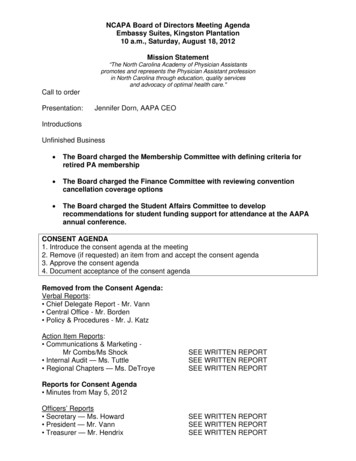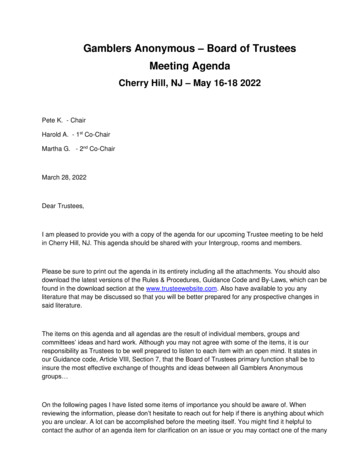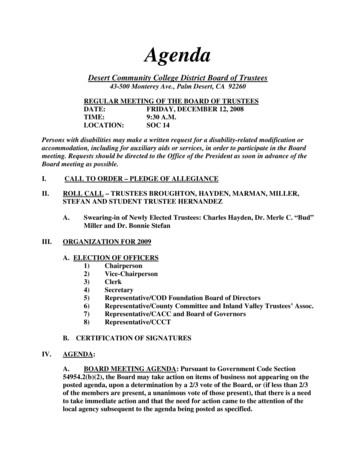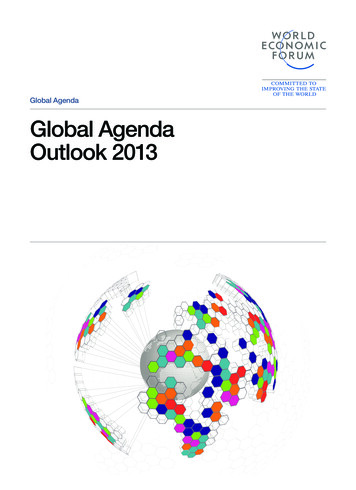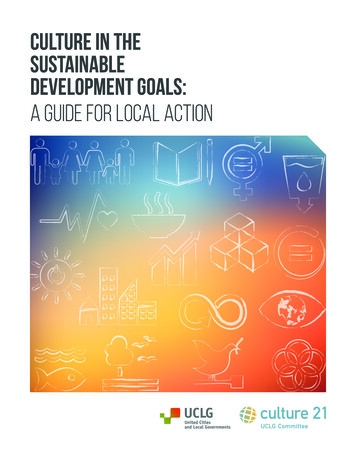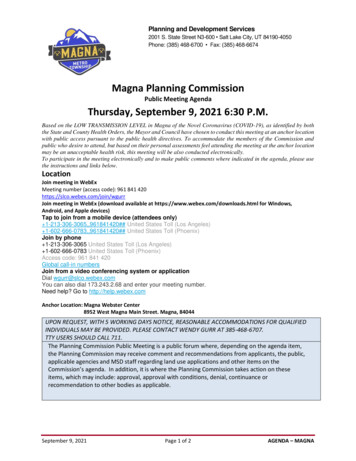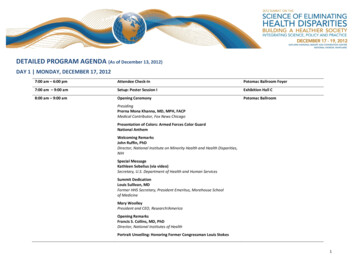
Transcription
DETAILED PROGRAM AGENDA (As of December 13, 2012)DAY 1 MONDAY, DECEMBER 17, 20127:00 am – 6:00 pmAttendee Check-InPotomac Ballroom Foyer7:00 am – 9:00 amSetup: Poster Session IExhibition Hall C8:00 am – 9:00 amOpening CeremonyPotomac BallroomPresidingPrerna Mona Khanna, MD, MPH, FACPMedical Contributor, Fox News ChicagoPresentation of Colors: Armed Forces Color GuardNational AnthemWelcoming RemarksJohn Ruffin, PhDDirector, National Institute on Minority Health and Health Disparities,NIHSpecial MessageKathleen Sebelius (via video)Secretary, U.S. Department of Health and Human ServicesSummit DedicationLouis Sullivan, MDFormer HHS Secretary, President Emeritus, Morehouse Schoolof MedicineMary WoolleyPresident and CEO, Research!AmericaOpening RemarksFrancis S. Collins, MD, PhDDirector, National Institutes of HealthPortrait Unveiling: Honoring Former Congressman Louis Stokes1
9:00 am – 9:45 amKeynote PresentationSocial Determinants of Global Population Health and HealthDisparitiesPotomac BallroomDavid Satcher, MD, PhD16th U.S. Surgeon General, Director, Satcher HealthLeadership Institute9:45 am – 10:00 amBreak10:00 am – 11:15 amPlenary Session IInternational Viewpoints on Building a Healthier Global Society11:15 am – 12:30 pmLouis W. Sullivan, MDFormer HHS Secretary, President Emeritus, Morehouse Schoolof MedicineLia Maria dos SantosTechnical Consultant, Implementation of the National Policyof Health Integration, Brazilian Ministry of HealthHerman JacobsCounselor, Social and Economic Development, Embassy ofSouth AfricaSofía Leticia Morales Garza, PhDSenior Advisor Millennium Development Goals, Pan AmericanHealth OrganizationDavid R. Williams, PhD (Moderator)Florence Sprgue Norman and Laura Smart Norman, Professor ofPublic Health, Harvard School of Public HealthPlenary Session IISocial Determinants of Health: Global PerspectivesPotomac BallroomPotomac BallroomPaula Braveman, MD, MPHDirector, Center on Social Disparities in Health, Universityof California, San FranciscoGerry GallagherActing Director General, Social Determinants and ScienceIntegration, Public Health Agency of CanadaC. James Hospedales, MD, MPHSenior Advisor, Prevention and Control of Chronic Diseases,Pan American Health OrganizationFitzhugh Mullan, MD (Moderator)Murdock Head Professor of Medicine and Health Policy, TheGeorge Washington University2
12:30 pm – 1:30 pmPoster Session ILunch (On Your Own)Concurrent Session A1:30 pm – 3:00 pmNUMBERA1-01ROOMNational Harbor 10/11SESSION TITLESocial, Biological and Environmental Disparities inChildhood Developmental Health OutcomesA1-02Annapolis Room 1Approaches for Identifying and AddressingEnvironmental Health Disparities andEnvironmental Justice in Decision MakingA1-03Annapolis Room 2Reducing Health Disparities through Programs atthe U.S. Department of Housing and UrbanDevelopmentExhibition Hall CSPEAKERS/MODERATORSMODERATOR: Molly Davis, George Mason UniversityFrances A. Campbell, University of North Carolina at Chapel HillDoes Enhancement of Academic Skills in Childhood Also EnhanceAdult Health Status?Margaret Ensminger, Johns Hopkins University Bloomberg Schoolof Public HealthEarly Adversity and Behavior: Their Joint Developmental Impactover the Life Course from Age 6 to Mid AdulthoodJames E. Swain, University of MichiganChildhood Poverty and Brain Development: The Role of ChronicStress and ParentingMODERATOR: Onyemaechi Nweke, U.S. Environmental ProtectionAgency & Office of Minority Health, Office of the Assistant Secretaryfor Health, DHHSMODERATOR: Devon Payne-Sturges, U.S. Environmental ProtectionAgencyNeal Fann, U.S. Environmental Protection AgencyMaximizing Health Benefits and Minimizing Inequality and/orEnvironmental Justice Analysis of PM2.5 Benefits to Vulnerableand Susceptible PopulationsSymma Finn, National Institute of Environmental Health Sciences,NIHEnvironmental Health Disparities and Environmental Justice:What's the Difference?Amy Krings, University of MichiganA Case Study of How a Marginalized Community Negotiates aCommunity Benefits AgreementMODERATOR: Matthew Ammon, U.S. Department of Housing andUrban DevelopmentRon Ashford, U.S. Department of Housing and Urban DevelopmentHealth Initiatives for Public Housing ResidentsPeter J. Ashley, U.S. Department of Housing and UrbanDevelopmentHealthy Homes Program Highlights: Sustainable CommunitiesApproaches for Healthy CommunitiesSunaree Marshall, U.S. Department of Housing and UrbanDevelopmentBuilding Sustainable and Healthy CommunitiesElizabeth Rudd, U.S. Department of Housing and UrbanDevelopmentInvestigating the Health of HUD-Assisted ResidentsJon Sperling, U.S. Department of Housing and Urban DevelopmentInvestigating the Health of HUD-Assisted ResidentsBarry Steffen, U.S. Department of Housing and Urban DevelopmentInvestigating the Health of HUD-Assisted Residents3
NUMBERA1-05ROOMWoodrow Wilson CSESSION TITLEWomen and Diabetes - Prevention, Policy &Culturally Competent Care to Address HealthDisparitiesA1-06Baltimore Room 3The Stroke Disparities Program: InnovativeApproaches to Reducing Racial and EthnicDisparitiesA1-07Potomac Room 3Elder Abuse in Diverse Communities: Scope,Culture, and Policy ImplicationsA1-08Woodrow Wilson BPublic Policies, System-Level and EnvironmentalStrategies to Address Obesity Prevention andHealthSPEAKERS/MODERATORSMODERATOR: Janine Clayton, Office of Research on Women'sHealth, NIHAngela Bates, Office of Research on Women’s Health, DHHSSanford Garfield, National Institute of Diabetes and Digestive andKidney Diseases, NIHDiabetes Prevention Program: Full Study and Gestational DiabetesMellitus OutcomesMichelle Owens-Gary, U.S. Centers for Disease Control andPreventionCulturally Competent Care: Diabetes Education in theMulticultural CommunitySusan F. Wood, The George Washington UniversityThe Affordable Care Act and Prevention Programs - Implicationsfor WomenMODERATOR: Dorothy Farrar Edwards, University of Wisconsin,MadisonMODERATOR: Salina Waddy, National Institute of NeurologicalDisorders and Stroke, NIHBernadette Boden-Albala, Mount Sinai School of MedicineDiffErenCes in the Imaging of Primary Hemorrhage based onEthnicity or Race (DECIPHER)Alexander Dromerick, Georgetown UniversityAcute Stroke Program of Interventions Addressing Racial andEthnic Disparities (ASPIRE)Chelsea Kidwell, Georgetown UniversityPreventing Recurrence of Thromboembolic Events throughCoordinated Treatment in the District of Columbia (PROTECT DC)MODERATOR/SPEAKER: Matthew Janicki, University of Illinois atChicagoMODERATOR/SPEAKER: Sidney Stahl, National Institute on Aging,NIHXin Qi Dong, Rush University Medical CenterCharles P. Mouton, Meharry Medical CollegeMODERATOR: Natasha Coulouris, Health Resources and ServicesAdministration, DHHSMODERATOR: Susan Persky, National Human Genome ResearchInstitute, NIHAlexandra Adams, University of WisconsinHealthy Children, Strong Families: Results of a Randomized Trial ofObesity Prevention for Preschool American Indian Children andTheir FamiliesLisa Guillermin Gable, Healthy Weight Commitment FoundationENERGY Balance101: Excitement, Engagement and ImpactIris Joi Hudson, U.S. Centers for Disease Control and Prevention,DHHSIdentifying Health Disparities in Obesity and Obesity RelatedBehaviors4
NUMBERROOMSESSION TITLEA1-09Potomac Room 6Public Housing and Public Health Practice:Addressing Oral Health Disparities Where PeopleLiveA1-10Woodrow Wilson AAssessment of Racial Discrimination: Measurementand Policy IssuesA1-11Potomac Ballroom ABCDRoundtable Discussion: New Directions inHealthcare Disparities Research, Practice and PolicySPEAKERS/MODERATORSKeawe’aimoku Kaholokula, University of Hawaii at ManoaThe PILI ‘Ohana Project: Partnerships, Collaborations, andIntervention Dissemination to Address Obesity Disparities inHawaii and the PacificZeniada NatividadThe Guam Sustantia Project: Taking Childhood Obesity off theMenuMODERATOR/SPEAKER: Ruth Nowjack-Raymer, National Instituteof Dental and Craniofacial Research, NIHMODERATOR/SPEAKER: Capt. William Bailey, U.S. Public HealthService, U.S. Centers for Disease Control and Prevention, DHHSMichelle Henshaw, Boston UniversityMultimodal Approach to Caries Prevention in Public Housing byOral Health AdvocatesMark D. Macek, University of MarylandHealth Literacy in Context: The Multi-Site Assessment of HealthLiteracy and Oral HealthSusan K. Reisine, University of ConnecticutChanging Oral Health Norms and Hygiene Practices amongVulnerable Older Adults Living in Publicly Funded Senior HousingMODERATOR/SPEAKER: David Chae, Emory UniversityThe Importance of Implicit Racial Bias and Racial Identity for theSelf-Report of DiscriminationMODERATOR/SPEAKER: Derek Griffith, Vanderbilt UniversityHe's Discriminated Against For Who He Is: Is the Stress andDiscrimination that African American Men Report the Result ofRace and Gender or Race or GenderTené T. Lewis, Emory UniversityBlack-White Differences in Responses to Items on the EverydayDiscrimination Scale: A Differential Item Functioning AnalysisWizdom Powell Hammond, University of North Carolina at ChapelHillWhat Gets Measured Gets Done?!" Monitoring EverydayDiscrimination Experiences and Policies in a 'Post-Racial' ContextMODERATOR: Karen Anderson, Institute of MedicineMODERATOR: Fitzhugh Mullan, The George Washington UniversityDavid Atkins, Veterans Health AdministrationEffective Health Services and Quality Initiatives within the VASystemGarth Graham, University of Florida School of MedicineImpact of Payment Models and Delivery Systems in ReducingHealth Disparities with a Focus on Pay for PerformanceRomana Hasnain-Wynia, Patient Centered Outcomes ResearchInstituteCreating a Disparities Research Agenda: Reducing Disparities andImproving Health OutcomesLisa Simpson, AcademyHealthDisparities Research 2.0: From Description to Intervention5
NUMBERROOMSESSION TITLEA1-12Annapolis Room 3A Conversation on Data Sharing in IndigenousPopulationsA1-14National Harbor 12/13Addressing Health Disparities among Latinos:Innovative Academic-Community PartnershipsA1-15Annapolis Room 4Integrated Panel Discussion: Patient-ReportedOutcomes Measurement Information System (PROMIS ) and Health DisparitiesSPEAKERS/MODERATORSMarcia Wilson, The George Washington UniversityReducing Disparities in the Health Care System: Eight Challengesand their SolutionsMODERATOR: Lucia Hindorff, National Human Genome ResearchInstitute, NIHMODERATOR: Alek Sripipatana, Health Resources and ServicesAdministration, DHHSShelley Cole, Texas Biomedical Research InstituteProgress Towards a Workable Solution: The Researcher asFacilitatorBonnie Duran, University of WashingtonResearch for Improved Health—Promoters and Barriers toEffective Community Engaged ResearchRichard J. Fabsitz, National Heart, Lung, and Blood Institute, NIHBalancing Interests in the NIH Data Sharing PolicyJeffrey A. Henderson, Black Hills Center for American Indian HealthMalia Villegas, National Congress of American IndiansMODERATOR: Lorenzo Olivas, U.S. Public Health Service, Region VIIIMODERATOR: Milagros C. Rosal, University of MassachusettsSergio Aguilar-Gaxiola, University of California, DavisCommunity-Defined Solutions for Latino Mental Health CareDisparities: Achieving Capacity-Building and SustainingOrganizationMario De La Rosa, Florida International UniversityAddressing HIV and Substance Abuse-Related Health Disparitiesamong Latina Women: An Academic-Community PartnershipApproachLisa Fortuna, University of Massachusetts Medical SchoolCommunity-Academic Partnership for Developing PatientCentered Dual Diagnosis Treatment for LatinosGustavo Loera, Mental Health America of Los AngelesCommunity-Defined Solution for Latino Mental Health CareDisparities: Achieving Capacity-Building and SustainingOrganizationSusan Rubio Rivera, MUJER, Inc.Addressing HIV and Substance Abuse-Related Health Disparitiesamong Latina Women: An Academic-Community PartnershipApproachPatria Rojas, Florida International UniversityAddressing HIV and Substance Abuse-Related Health Disparitiesamong Latina Women: An Academic-Community PartnershipApproachMODERATOR: Derrick Tabor, National Institute on Minority Healthand Health Disparities, NIHMODERATOR/SPEAKER: Phil Tonkins, National Institute of Arthritisand Musculoskeletal and Skin Diseases, NIHAn Introduction to the Patient-Reported Outcomes MeasurementInformation System 6
NUMBERROOMSESSION TITLEA1-16Potomac Room 2Community-Based Approaches to Studying Healthin Urban Slums in India: Methods, Findings, andPolicy-Level ResponseA2-17Baltimore Room 2An Integrated Approach to Childhood ObesityPreventionA2-18National Harbor 4/5Promoting a Diverse Training Research, Practiceand Policy Health WorkforceA2-19Baltimore Room 1Mobilizing a Culturally Competent Workforce: TheNational Standards on Culturally and LinguisticallyAppropriate Services (CLAS) in Health and HealthCareSPEAKERS/MODERATORSKevin P. Weinfurt, Duke Clinical Research InstituteThe Science of PROMIS in the Evaluation of Health DisparitiesEdward Yelin, University of California, San FranciscoThe Use of PROMIS Item Banks to Address Health DisparitiesMODERATOR: Ligia Artiles, National Institute on Minority Healthand Health Disparities, NIHMODERATOR: Joshua Rosenthal, Fogarty International Center, NIHRamnath Subbaraman, Massachusetts General Hospital, Brighamand Women’s Hospital, Partners for Urban Knowledge, Action &ResearchTejal Shitole, Partners for Urban Knowledge, Action, and ResearchDana Thomson, Harvard School of Public HealthSimple, Affordable, Scalable Mapping Methods for Global HealthDisparities ResearchMODERATOR: Deirdra Chester, U.S. Department of AgricultureMODERATOR/SPEAKER: Dionne Toombs, U.S. Department ofAgricultureRose Velia Gomez-Camacho, University of California, DavisNiños Sanos, Familia Sana: An Intervention Study to PreventChildhood Obesity in Mexican-Origin Children in Rural CaliforniaLucia L. Kaiser, University of California, DavisNiños Sanos, Familia Sana: An Intervention Study to PreventChildhood Obesity in Mexican-Origin Children in Rural CaliforniaKendra K. Kattelman, South Dakota State UniversityRachel Novotny, University of Hawaii at ManoaChild Obesity Prevention among Remote Underserved MinorityPopulations of the Pacific RegionMODERATOR: Jasjit Ahluwalia, University of MinnesotaMODERATOR: Meaghan McHugh, Association of University Centerson DisabilitiesEstela Estape, University of Puerto RicoPRCTRC: A Multi Institutional Collaborative Effort to IncreaseDiversity in Clinical and Translational Research throughMultidisciplinary Training and Career Development (MTCD)Joan Y. Reede, Harvard Medical SchoolThe Nature and Importance of Co-authorship Networks inAdvancing Faculty Diversity in Academic MedicineNadra Tyus, Health Resources and Services Administration, DHHSHealth Workforce Research: Diversity in the Health ProfessionsMODERATOR: Godfrey Jacobs, SRA International, Inc.Tawara Goode, Georgetown UniversityRobert Like, Robert Wood Johnson Medical SchoolEducating Health Care Professionals about CLAS: Experiencesfrom the Field and Lessons LearnedGuadalupe Pacheco, Office of Minority Health, DHHSThe National Standards for Culturally and LinguisticallyAppropriate Services (CLAS) in Health and Health Care7
NUMBERA2-20ROOMPotomac Room 5SESSION TITLEThe U.S. - Brazil Joint Action Plan to Eliminate Racialand Ethnic Discrimination and Promote Equality(JAPER): A Cooperative Approach to AddressingSocial Exclusion and Health DisparitiesA2-21Potomac Room 1Recruitment, Retention, and Data Collection amongDiverse Population Groups in the NationalChildren’s Study – Implications for HealthDisparities ResearchA2-22Baltimore Room 4Data Collection Standards for Race, Ethnicity, Sex,Primary Language and Disability StatusA3-23Baltimore Room 5Public Health and Safety Partnerships to AddressHIV Substance Abuse-Related Health Disparities inthe Criminal Justice SystemSPEAKERS/MODERATORSMODERATOR: Nils Daulaire, Office of Global Affairs, DHHSMaria Ines de Silva Barbosa, Brazilian Ministry of HealthAddressing Health Disparities in BrazilZakiya Carr-Johnson, U.S. Department of StateHistory and Overview of JAPERJulio Dicent Taillepierre, U.S. Centers for Disease Control andPrevention, DHHSAddressing Health Disparities in the United StatesTonija Hope Navas, U.S. Civil SocietyThe Role of the Diaspora in Addressing Health DisparitiesMODERATOR: Christina Park, Eunice Kennedy Shriver NationalInstitute of Child Health and Human Development, NIHCarl Hill, Eunice Kennedy Shriver National Institute of Child Healthand Human Development, NIHCarol Kasten, Eunice Kennedy Shriver National Institute of ChildHealth and Human Development, NIHMaria Lopez-Class, Eunice Kennedy Shriver National Institute ofChild Health and Human Development, NIHEric Lorenzo, Eunice Kennedy Shriver National Institute of ChildHealth and Human Development, NIHJulia Slutsman, Eunice Kennedy Shriver National Institute of ChildHealth and Human Development, NIHMODERATOR: Virginia Cain, U.S. Centers for Disease Control andPrevention, DHHSRashida Dorsey, Office of Minority Health, Office of the AssistantSecretary for Health, DHHSHHS Data Standards: Overview, Implementation, Enhancementsfor HHS Data CollectionsJ. Nadine Gracia, Office of Minority Health, Office of the AssistantSecretary for Health, DHHSImplications of HHS Data Standards for Disparities EffortsMegan Thomas, Centers for Medicare and Medicaid Services, DHHSImplementing Section 4302(b) - Data Standards in Medicaid andCHIPMODERATOR: Shoshana Kahana, National Institute on Drug Abuse,NIHFrederick L. Altice, Yale UniversityReducing Health Disparities by Treating HIV and Drug Use withinCriminal Justice SettingsPaul Samuels, Legal Action CenterMaking Communities Healthy and Safe: Policies to Address HIVand Drug Abuse Related Health Disparities in the Criminal JusticeSystemPaula Smith, North Carolina Department of Public SafetyProvision of HIV Services in North Carolina Prisons: Opportunities& ChallengesTisha Wiley, National Institute on Drug Abuse, NIHCriminal Justice Populations and Health Disparities: Where are theTreatment and Research Gaps?8
NUMBERA3-24ROOMWoodrow Wilson DSESSION TITLEBuilding Strong Community-Academic Partnerships:A Pathway to Ethically Responsible ResearchA3-25Potomac Room 4The Federal Environmental Justice InteragencyWorking Group: Improving Health and Environmentin Communities across AmericaA3-26National Harbor 2/3Reducing Health Disparities through Innovation3:00 pm – 3:15 pmBreak3:15 pm – 4:45 pmConcurrent Session BNUMBERB1-02ROOMAnnapolis Room 4SESSION TITLEVaccine and Behavioral Approaches to U.S. HealthDisparities: Sexually Transmitted Infections (STI)and AddictionB1-03Chesapeake Room 1Research and Community Efforts to Address InnerCity AsthmaSPEAKERS/MODERATORSMODERATOR: Theresa P. Castillo, U.S. Food and DrugAdministrationBert Boyer, University of Alaska, FairbanksWalkie Charles, University of Alaska, FairbanksScarlett Hopkins, Center for Alaska Native Health Research,University of Alaska, FairbanksRosalina James, University of WashingtonHenry Lupie, Center for Alaska Native Health Research, University ofAlaska, FairbanksMODERATOR: Sherri White-Williamson, U.S. EnvironmentalProtection AgencyMelinda Downing, U.S. Department of EnergyRon Milam, U.S. Public Health Service, DHHSJames M. Potter, U.S. Department of Housing and UrbanDevelopmentMODERATOR/SPEAKER: Cara James, Centers for Medicare andMedicaid Services, DHHSFramework and the Importance of the Demonstration Projectswith Regards to Enhancing Knowledge of Potential Solutions toHealth DisparitiesScott Berkowitz, Johns Hopkins University School of MedicineJohns Hopkins Community Health PartnershipSean Cavanaugh, Centers for Medicare and Medicaid Services,DHHSOverview of the Innovation ModelsConnie Halverson, Delta Dental Philanthropic FundSPEAKERS/MODERATORSMODERATOR: Guillermo Aviles-Mendoza, U.S. Public HealthService, National Vaccine Program OfficeMODERATOR/SPEAKER: David Curry, Center for Vaccine Ethics andPolicyThomas Kosten, Baylor College of MedicineSusan Rosenthal, Columbia UniversityDavid Wetter, University of Texas MD Anderson Cancer CenterMAPS: Behavior Change in Low Socioeconomic Status PopulationsMODERATOR/SPEAKER: Alkis Togias, National Institute of Allergyand Infectious Diseases, NIHLara Akinbami, U.S. Centers for Disease Control and Prevention,DHHSNational Trends in Asthma Disparities Among ChildrenFloyd Malveaux, Merck Childhood Asthma Network, Inc.Translation of Evidence-based Pediatric Asthma Interventions inCommunity Settings9
NUMBERROOMSESSION TITLEB1-04National Harbor 10/11New Directions in Addressing Mental HealthDisparities in Ethnic Minority PopulationsB1-05Chesapeake Room 4Disparities in Kidney Disease and TransplantationB1-06Potomac Ballroom ABCDStress and the Superwoman: An Innovative Agendafor African American Women’s Health DisparitiesResearch, Practice, and PolicyB1-07Potomac Room 6The State of the Science in Disability Research andPolicySPEAKERS/MODERATORSStephen B. Teach, Children's National Medical CenterPediatric Asthma DisparitiesMODERATOR: Juliet Bui, Substance Abuse and Mental HealthServices Administration, DHHSMODERATOR: Alan Trachtenberg, Indian Health Service, DHHSMargarita Alegría, Harvard Medical SchoolAddressing Mental Health in Latino Populations - Science, Practiceand Policy PerspectivesMichelle Browne, Health Resources and Services Administration,DHHSMental Health Disparities Among the U.S. Population of BlackChildrenJoan Chiao, Northwestern UniversityPopulation Disparities in Mental Health: Insights from CulturalNeuroscienceMODERATOR: Kevin McBryde, National Institute of Diabetes andDigestive and Kidney Diseases, NIHMODERATOR: Arthur Franke, National Kidney Foundation ofMichiganJuan Carlos Caicedo, Northwestern University Feinberg School ofMedicineCultural Competency in Organ Transplantation to Increase LiveKidney Donation Rates in Hispanic Americans: The NorthwesternUniversity Hispanic Transplant Program ExperienceLarissa Myaskovsky, University of Pittsburgh & VA PittsburghHealthcare SystemCultural and Psychosocial Factors Predict Racial Disparities inKidney Transplant EvaluationDavid Taber, Medical University of South CarolinaThe Impact of Diabetes and Glycemic Control on Ethnic Disparitiesin Kidney TransplantationBessie Young, University of WashingtonFocus Group Evaluation of New Educational Material from theIncreasing Kidney Awareness Network (IKAN) Transplant ProjectMODERATOR/SPEAKER: Cheryl Woods-Giscombe, University ofNorth Carolina at Chapel HillAngela Black, University of Illinois at Urbana - ChampagneAmani M. Nuru-Jeter, University of California, BerkeleyMODERATOR: Shelley Reeves, National Institute on Disability andRehabilitation Research, U.S. Department of EducationTamar Heller, University of Illinois at ChicagoNancy A. Miller, University of Maryland, Baltimore CountyDifferences by Gender, Disability and Age in the Receipt ofPreventive ServicesJames H. Rimmer, University of Alabama at BirminghamJohn H. Stone, Center for International Rehabilitation ResearchInformation and ExchangeHealth Disparities in the World Report on Disability10
NUMBERB1-08ROOMAnnapolis Room 1SESSION TITLERacial and Ethnic Differences and Disparities inPain: The State of the Science of InclusionB1-09Baltimore Room 5Improving Health of LGBT PopulationB1-10National Harbor 12/13Promoting Clinical and Community PreventiveServices in Socially Disadvantaged PopulationsB2-11Woodrow Wilson DQuantitative Methods for Measuring HealthDisparities to Track Progress and DiscriminateAmong Policy ChoicesB1-12National Harbor 4/5Unconscious Bias: Does It Really Impact ClinicalCare and What We Can Do About It?SPEAKERS/MODERATORSMODERATOR: Salina Waddy, National Institute of NeurologicalDisorders and Stroke, NIHCarmen R. Green, University of MichiganMODERATOR: Nathan Stinson, National Institute on MinorityHealth and Health Disparities, NIHMODERATOR: Elizabeth Wehr, Eunice Kennedy Shriver NationalInstitute of Child Health and Human Development, NIHJudith B. Bradford, Fenway InstituteSusan Newcomer, Eunice Kennedy Shriver National Institute of ChildHealth and Human Development, NIHDiscussion of the NIH FOA on LGBT HealthAJ Pearlman, U.S. Department of Health and Human ServicesHector Vargas, Gay and Lesbian Medical AssociationMODERATOR: Leonard Egede, Medical University of South CarolinaMODERATOR: Shanita Williams, Health Resources and ServicesAdministration, DHHSDavid Baker, Northwestern UniversityStrategies to Reduce Disparities in Clinical and CommunityPreventive ServicesGlenn Flores, University of Texas Southwestern & Children’sMedical Center of DallasA Cost-Effective, Community-Based Intervention SuccessfullyEliminates a Racial/Ethnic Disparity in Children’s Health andHealthcareKathryn G. Kietzman, University of California, Los AngelesStrategies for Reducing Disparities in the Use of Clinical PreventiveServices among Older Adults in Community SettingsGbenga Ogedebe, New York UniversityChronic Disease among African American MenMODERATOR: Onyemaechi Nweke, U.S. Environmental ProtectionAgency & Office of Minority Health, Office of the Assistant Secretaryfor Health, DHHSYukiko Asada, Dalhousie UniversitySummarizing Social Disparities in HealthCaitlin Hennessy, RTI InternationalCommunity Health Surveillance: Assessing Capacity forMonitoring Chronic Disease Outcomes in Health DisparatePopulationsHenry Roman, Industrial Economics, Inc.Applying Inequality Indices to Discriminate Among PolicyOptions:A Case StudyMakram Talih, U.S. Centers for Disease Control and Prevention,DHHSTracking Health Disparities in Healthy People 2020: Methods andChallengesMODERATOR: Irene Dankwa-Mullan, National Institute on MinorityHealth and Health Disparities, NIHMODERATOR/SPEAKER: Adil Haider, Johns Hopkins Center forSurgery Trials and Outcomes Research11
NUMBERROOMSESSION TITLEB1-13National Harbor 2/3Discrimination and Health Outcomes across theLifespan: New Research and Policy, Practice, andCommunity Implications for Reducing DisparitiesB1-14Woodrow Wilson APatient-Centered Outcomes and EffectivenessResearch in Health DisparitiesB1-15Woodrow Wilson CSuccesses, Challenges and Innovations inCommunity Engagement and RecruitmentB1-16Annapolis Room 3Addressing Social Disparities in Global PopulationHealthSPEAKERS/MODERATORSClarence Braddock, Stanford UniversityL.D. Britt, Eastern Virginia Medical SchoolLisa Cooper, Johns Hopkins University School of MedicineMarc Nivet, Association of American Medical CollegesMODERATOR/SPEAKER: David Williams, Harvard University Schoolof Public HealthValerie Earnshaw, Yale UniversityRace-Based Bullying and Smoking InitiationLisa Rosenthal, Yale UniversityDiscrimination and Sexual Risk among Young Urban PregnantWomen of ColorNatalie Slopen, Center on the Developing Child, Harvard UniversityMODERATOR: Nakela Cook, National Heart, Lung, and BloodInstitute, NIHMODERATOR/SPEAKER: Michael Lauer, National Heart, Lung, andBlood Institute, NIHJoel Kupersmith, U.S. Department of Veterans AffairsAnne Trontell, Agency for Healthcare Research and Quality, DHHSMODERATOR: Phillip Alberti, Association of American MedicalCollegesMODERATOR: Jamila R. Rashid, U.S. Department of Health andHuman ServicesFatimah Jackson, University of North Carolina at Chapel HillIdentifying the Consequences of Faith-Based Practices on HealthDisparities among American MuslimsNamratha Kandula, Northwestern UniversityA Family and Community-Centered Approach to Increase SouthAsian Americans Participation in Clinical Research StudiesSandra Quinn, Maryland Center for Health Equity, University ofMarylandImproving Informed Consent: Listening to the Voices of AfricanAmericans and Latinos to Shape Investigators’ PracticesStephen Thomas, University of Maryland School of Public HealthMethods and Procedures for Community Engagement:Recruitment of African Americans into a Clinical Trial in PreventingDepressionMODERATOR: Richard Berzon, National Institute on Minority Healthand Health Disparities, NIHMODERATOR: Oliver Ou, U.S. Public Health Service & NationalCancer Institute, NIHKevin Bialy, Fogarty International Center, NIHThe Fogarty International Center: Creating Partnerships in GlobalHealth ResearchDonaldson Conserve, Pennsylvania State UniversityDiscussion of HIV with Sexual Partners and Condom Use: TheResults of Two Consecutive Community Surveys Conducted in theWestern Cape, South AfricaSilviya Nikolova, University of Texas, ArlingtonHIV and Gender-Based Violence Nexus: An Exploratory Study12
NUMBERROOMSESSION TITLEB2-17Woodrow Wilson BRole of Community Health Workers in Addressingand Eliminating Health Disparities: Research andPolicy IssuesB2-18Potomac Room 2Building Racial and Ethnic Minority Presence andPerspective in the Academic Medicine PipelineB2-19Baltimore Room 1Successes, Challenges and Innovations inCommunity Capacity-BuildingSPEAKERS/MODERATORSNancy A. Perrin, Kaiser Permanente Center for Health ResearchInnovative Mixed-Methods to Understand and Address SocialDeterminants of Health Disparities in a Post-Conflict SettingMODERATOR: Gloria Ortiz, National Heart, Lung, and BloodInstitute, NIHMODERATOR: Chazeman Jackson, Office of Minority Health, DHHSJose Luchsinger, Columbia UniversityCommunity Health Workers in Northern Manhattan: From Theoryto PracticeSally Findley, Columbia University Medical CenterCommunity Health Workers in Northern Manhattan: From Theoryto PracticePatricia Peretz, New York Presbyterian HospitalCommunity Health Workers in Northern Manhattan: From Theoryto PracticeVallabh Shah, University of New Mexico Health Sciences CenterIdentifying Barriers to Health Care to Reduce Health Disparity inZuni Indians using Focus Group Conducted by Community HealthWorkersDana Thomson, Harvard Medical SchoolRwandan HIV-Infected Adults Experience Sizable PsychosocialHealth Gains in Community-Based Accompaniment Programversus Clinical-Care-Only ProgramMODERATOR/SPEAKER: John Sanchez, Albert Einstein College ofMedicineBrandi Free
The Affordable Care Act and Prevention Programs - Implications for Women . A1-06 . Baltimore Room 3 . The Stroke Disparities Program: Innovative Approaches to Reducing Racial and Ethnic Disparities . MODERATOR: Dorothy Farrar Edwards, University of Wisconsin, Madison. MODERATOR: Salina Waddy, National Institute of Neurological Disorders and .
